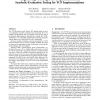Free Online Productivity Tools
i2Speak
i2Symbol
i2OCR
iTex2Img
iWeb2Print
iWeb2Shot
i2Type
iPdf2Split
iPdf2Merge
i2Bopomofo
i2Arabic
i2Style
i2Image
i2PDF
iLatex2Rtf
Sci2ools
229
click to vote
POPL
2006
ACM
2006
ACM
Engineering with logic: HOL specification and symbolic-evaluation testing for TCP implementations
The TCP/IP protocols and Sockets API underlie much of modern computation, but their semantics have historically been very complex and ill-defined. The real standard is the de facto one of the common implementations, including, for example, the 15 000? 20 000 lines of C in the BSD implementation. Dealing rigorously with the behaviour of such bodies of code is challenging. We have recently developed a post-hoc specification of TCP, UDP, and Sockets that is rigorous, detailed, readable, has broad coverage, and is remarkably accurate. In this paper we describe the novel techniques that were required. Working within a general-purpose proof assistant (HOL), we developed language idioms (within higher-order logic) in which to write the specification: operational semantics with nondeterminism, time, system calls, monadic relational programming, etc. We followed an experimental semantics approach, validating the specification against several thousand traces captured from three implementations ...
Future Critical Software | General Terms Documentation | General-purpose Proof Assistant | POPL 2006 | Programming Languages |
| Added | 03 Dec 2009 |
| Updated | 03 Dec 2009 |
| Type | Conference |
| Year | 2006 |
| Where | POPL |
| Authors | Steve Bishop, Matthew Fairbairn, Michael Norrish, Peter Sewell, Michael Smith, Keith Wansbrough |
Comments (0)

